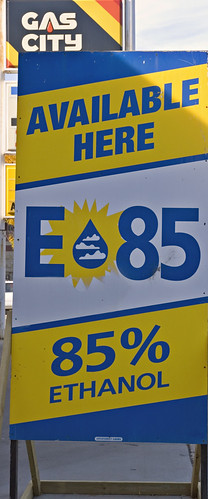Every action this President acts upon seems to have a dire consequence upon the future. Denigration of pollution controls shouldn't be a knee jerk Republican response, everyone benefits from having a cleaner environment, even our End-of-Times-believing schmuck of a leader.
An end run on ethanol
Rules for producing `clean' fuel may be relaxed, add pollutionAs President Bush promotes ethanol as a green alternative to gasoline, his administration is quietly relaxing environmental rules for dozens of new corn-to-fuel refineries sprouting up across the nation.
The U.S. Environmental Protection Agency is planning to change the way ethanol plants are treated under the Clean Air Act, a move critics say could make it easier for the burgeoning industry to evade controls that dramatically reduce toxic air pollution.
The shift in policy would give a break to agricultural conglomerates and newcomers seeking to cash in quickly on the nation's growing thirst for renewable fuel. More than 40 new ethanol plants are expected to be built during the next year, boosting U.S. production by 30 percent.
...Critics note that the ethanol industry has been growing rapidly despite existing environmental regulations. The number of corn-to-fuel refineries has increased to 101 this year from 50 in 1997, according to industry statistics.
The proposed rule, which need only be published in the Federal Register to take effect, comes less than four years after the Bush administration brokered a series of legal agreements promising deep cuts in air pollution from leading players in the industry.
...
EPA regulators had decided to take a closer look at the refineries after complaints about noxious odors coming from several ethanol plants in the Midwest. The agency discovered many were emitting carbon monoxide, methanol and cancer-causing chemicals at levels far greater than owners had reported.“Those facilities were prosecuted under the exact law they're proposing to weaken,” said John Walke, director of the Natural Resource Defense Council's clean air project. “They're cutting corners now so the wave of new ethanol plants can be bigger, cheaper and dirtier.”
But whether ethanol is good for the environment is being questioned.
The fuel additive releases somewhat less carbon dioxide than gasoline--reducing the amount of greenhouse gases that are making the planet hotter.
But the EPA recently reported that pumping more ethanol into cars and trucks is expected to increase levels of other chemicals that create smog, which can aggravate respiratory ailments.
Existing clean-air rules consider ethanol plants as major sources of air pollution if they emit more than 100 tons of toxic chemicals a year. Those that do must go through an intensive--and time-consuming--permit process.
They also must install equipment that burns off most of the emissions.
Under the proposed changes, ethanol plants wouldn't be subject to the stringent federal requirements unless they spewed more than 250 tons of air pollution per year. Most of the new refineries are expected to emit a few tons less than that.
The difference in emissions could be substantial, in part because the control equipment must reduce pollution levels by up to 95 percent.
...
Some state regulators worry that the projected increases in air pollution could make it more difficult for Chicago and other urban areas to meet federal health standards intended to protect people suffering from asthma and other respiratory illnesses.“If anything, we need to be paying closer attention to these operations, not looking the other way,” said William Becker, executive director of two associations that represent state air pollution regulators.
especially since the alleged costs of creating clean air aren't really as burdensome as some thought they would be:
Doyal said the Minnesota producers made the same arguments four years ago that the EPA is using today to justify changing the rules.But installing pollution controls at Al-Corn's plant turned out to be less expensive than the company thought, Doyal said. And heat generated by the thermal oxidizers helped cut the company's energy costs.
“It works really well,” he said. “And our emissions are next to nothing.”
update: per Flickr comments, see also Consumer Reports, and Car and Driver
Tags: Energy, /environment, /EPA

